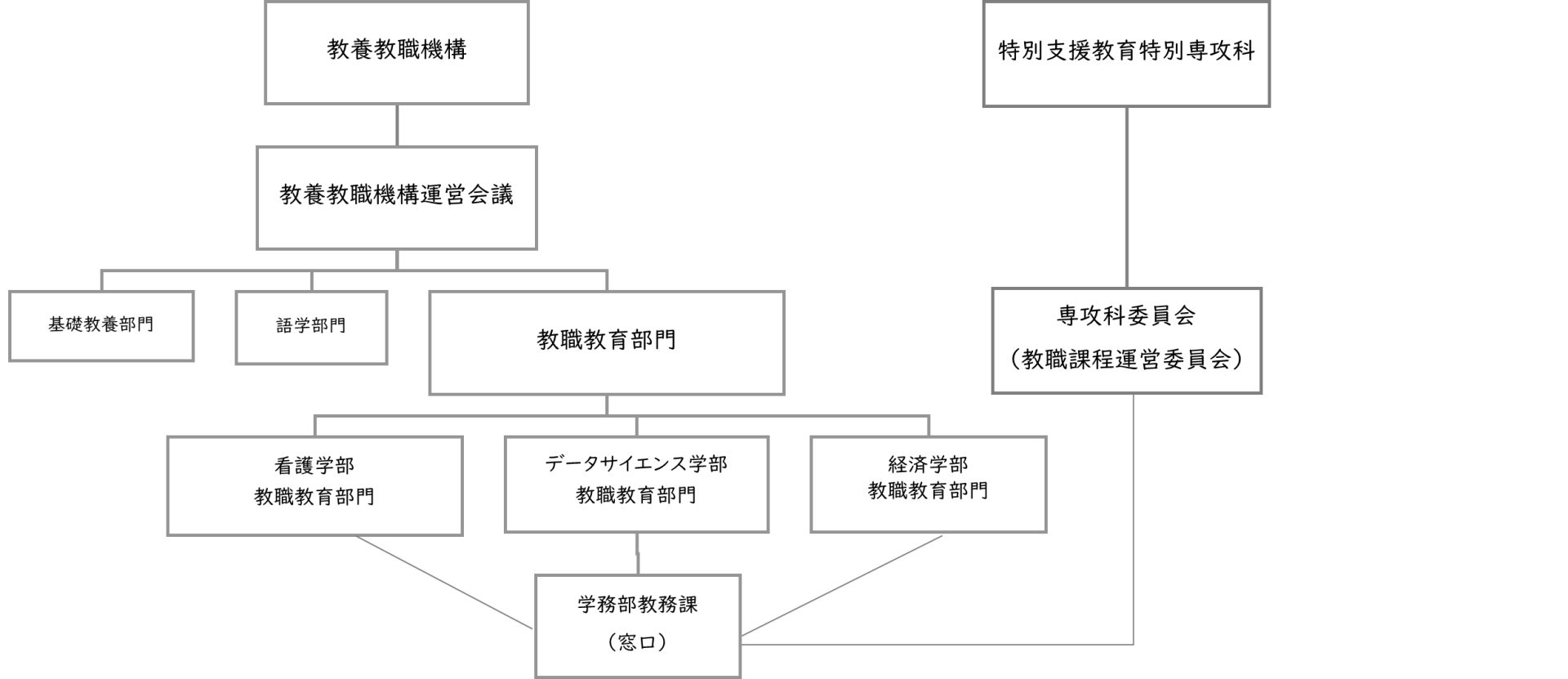- Home
- About Shimonoseki City University
- Publication of educational information
- Article 22-6 of the Enforcement Regulations of the Educational Staff License Act
- 2.Organizations and the number of faculty members related to the training of faculty members, the degree and performance of each faculty member, and the course subjects in charge of each faculty member
Article 22-6 of the Enforcement Regulations of the Educational Staff License Act
2.Organizations and the number of faculty members related to the training of faculty members, the degree and performance of each faculty member, and the course subjects in charge of each faculty member
Organization chart
Teaching Education Division, Special Major Courses Steering Committee and Educational Affairs Divisiton Student Affairs Department are in charge.

List of teachers in charge of teaching
Faculty of Economics
| Name | Job rank | Courses in charge |
|---|---|---|
| TANIGUCHI Hirokazu | Professor | Educational psychology, student guidance (including career guidance) |
| Takashi Watanabe | Professor | Educational consultation |
| AMANO Kaori | Associate Professor | Teaching theory, educational methodology (including ICT utilization), educational administration, moral education, educational practice, teaching practice exercises (middle and high schools) |
| ISHIKAWA Tomoko | Associate Professor | Educational Sociology |
| Mamiko Ota | Associate Professor | Special Needs Education Theory |
Faculty of Data Science
| Name | Job rank | Courses in charge |
|---|---|---|
| KONISHI Tetsuya | Professor | Teaching theory |
| Takashi Watanabe | Professor | Pre- and post-training instruction, practical training exercises (middle and high schools) |
| AMANO Kaori | Associate Professor | Education administration, pre- and post-training instruction, education practice, teaching practice exercises (middle and high schools) |
| ISHIKAWA Tomoko | Associate Professor | Educational Sociology |
| Mamiko Ota | Associate Professor | Special Needs Education Theory |
| TAKATA Kiyomi | Associate Professor | Educational consultation, pre- and post-training guidance |
Faculty of Nursing
| Name | Job rank | Courses in charge |
|---|---|---|
| KONISHI Tetsuya | Professor | Teaching theory, educational administration |
| ISHIKAWA Tomoko | Associate Professor | Educational Sociology |
| Mamiko Ota | Associate Professor | Special Needs Education Theory |
| TAKATA Kiyomi | Associate Professor | Educational consultation |
| Takumiko Shibasaki | Lecturer | Pre- and post-care training, nursing training, teaching practice exercises (care) |
Special Courses
| Name | Job rank | Courses in charge |
|---|---|---|
| NAKABAYASHI Hiroko | Professor | Special Needs Education Overview, Diversity Education Practice Research III, Special Needs School Education Practice Study, Special Needs School Education Practice Training |
| KIM Minji | Associate Professor | Psychology, physiology and pathology of persons with intellectual disabilities, psychology, physiology and pathology of persons with disabilities, psychology, physiology, and pathology of children or students with disabilities |
| CHO Chaeyoon | Associate Professor | Psychology, physiology and pathology of persons with physical disabilities, psychology, physiology and pathology of children or students with disabilities, psychology, physiology and pathology of persons with intellectual disabilities, inclusive education guidance method I, education for persons with disabilities |







